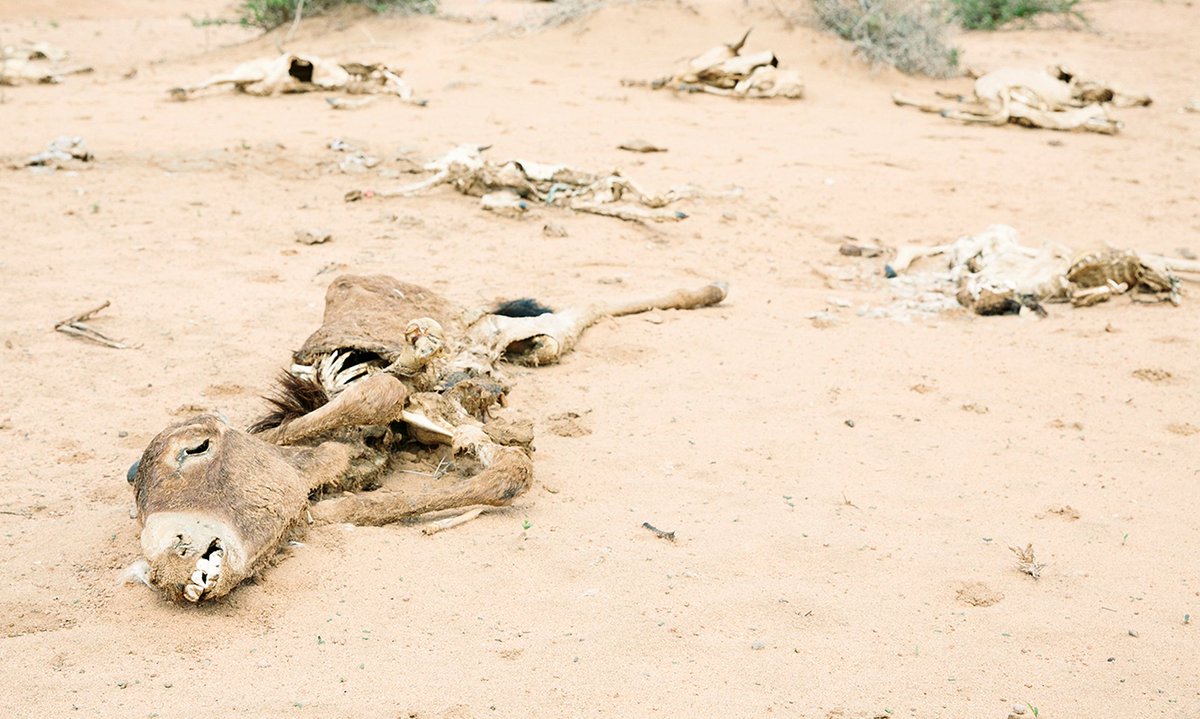
If you drive north from the Somaliland village of Gargara – where women speak of their heartache at losing goats in this year’s drought – and ford the fractured beds of dry rivers, passing the sun-bleached bones of dead animals, you eventually arrive in Lughaya, where open-mouthed fish lie on the white sands by the Red Sea after a wave “like a mountain” smashed into the coast this month.
This is what a changing climate looks like.
Somaliland, which broke away from Somalia in 1991 but is not recognised internationally, could be considered the canary in the mine of a world that is getting hotter, and where extreme weather is becoming more common.
Across this relatively peaceful corner of the Horn of Africa, where black-headed sheep scamper among the thorn bushes, dainty gerenuk balance on their hind legs to nibble from hardy shrubs, and skinny camels wearing rough-hewn bells lumber over rocky slopes, people long accustomed to a harsh environment find they cannot cope after years of below-average rainfall.
These pastoralists, who trek across rock and sand with their herds each day, have a vital stake in the UN climate talks taking place in Paris, which begin next week. For them, the changing climate is an immediate life-or-death challenge that has pushed their already tenuous existence to the very edge.
Droughts are common in this region of Africa, and famines not unknown – the last major famine to hit was in 2011.
But Mohamed Ali Ismail, a 70-year-old from the village of Bildhaaley, about three hours’ drive on bumpy tracks from the capital, Hargeisa, says things are steadily getting worse.
“I have lived here all my life. We were wealthy, and had lots of livestock. There were wild fruits on the trees, thick forests, good livestock and wild animals. We were not worrying about our life. But things got harder because the rain has failed, or is less frequent … In my 70 years, I have never seen an ostrich die without water, never seen a deer die without water, so when I see these wild animals dying, unlike at any time before, I don’t see the climate getting better … It is a critical situation.”
Ali Ismail does not know what to tell young villagers who wonder what the future holds.
“That’s the most crucial question. They become mature and they say, ‘We cannot live’ … They don’t know what to do so they cross the sea to seek a better life in Europe. We don’t have an answer.”
More than 240,000 people do not have enough food in Somaliland because of this acute drought caused by poor Gu rains (the region’s main rainy season) from April to June this year, and in 2014. Save the Children, which takes water to vulnerable people, provides chlorination, and builds wells and berkads, or reservoirs, says malnutrition rates – especially for children under five – are alarming and likely to increase.
This region has also been hit by the El Niño phenomenon, which is expected to last until early 2016. The UN has said that food insecurity will worsen, with the number of people needing aid rising to around 32 million by early next year.Ethiopia is particularly vulnerable, while floods in southern Somalia have displaced tens of thousands.
According to the ND-Gain Country Index, which summarises a country’s vulnerability to climate change and its readiness to improve resilience, Somalia isamong the world’s most vulnerable nations.
http://www.theguardian.com/global-d...ange-drought-cyclones-life-or-death-challengeYoonisonce had 250 goats and sheep and 10 camels. She now has 10 goats. Three of her children have gone to Djibouti. She has not heard from them since.
I am no longer thinking of being a pastoralist. Livestock are not useful. They die, so there is no point,” she says, rubbing her hands together. “I feel so much sadness and sorrow for how my life turned out. I was hoping it would be better.”
This is truly heartbreaking
 Floods down south and droughts down north. Climate change is really kicking our behinds. Waa Dhibaato!!
Floods down south and droughts down north. Climate change is really kicking our behinds. Waa Dhibaato!!
 For us when we were going through the same thing in the 70s if you like to know where the starving dhulbahante are now from then they own farms in the south
For us when we were going through the same thing in the 70s if you like to know where the starving dhulbahante are now from then they own farms in the south
